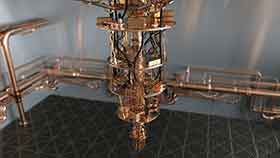 Developing a quantum computer is an exceptionally challenging task. Scientists are strenuously working on overcoming numerous obstacles and have made significant progress in meeting many important objectives. Still, many formidable problems remain, and intensive, arduous scientific research is needed to make advances.
Developing a quantum computer is an exceptionally challenging task. Scientists are strenuously working on overcoming numerous obstacles and have made significant progress in meeting many important objectives. Still, many formidable problems remain, and intensive, arduous scientific research is needed to make advances.
Quantum computers have tremendous potential and will radically transform innumerable industries. some examples include:
- material science
- financial services
- energy production and distribution
- pharmaceuticals and drug discovery
- cybersecurity
- sustainability
- logistics
- agriculture
- national security
- artificial intelligence
- cryptography
- machine learning
- travel and transportation
They offer:
- the ability to solve problems faster than classical computers
- achieve multiple solutions simultaneously
- solve complex problems involving large data sets
- process and transmit information in an interconnected manner
- data simulation computing
- store, retrieve, process large amounts of information
- privacy
- internet security
- increase processing power
- precision
Custom Master Bond epoxy, urethane modified epoxy, silicone, cyanoacrylate and UV / LED light or dual curing compounds may be utilized to meet unique evolving requirements for building quantum computers. Selection of the most desirable compound is dependent on the materials to be bonded and the operating conditions of the quantum computer. Types of substrates can range from niobium, aluminum, Kovar, Invar, silicon to aluminum oxide, silicon nitride, and sapphire. Execution of quantum computations can be adversely affected by noise, vibration, magnetic forces, temperatures, fluctuations in voltage from an electronic component, light, control electronics, connectivity, manufacturing consistency, coherence time, error correction, and sealability.
Master Bond can actively address crucial quantum computing issues by collaborating with scientists and researchers. We can create new products, adjust/modify existing formulation, and provide special packaging options to help resolve intricate undertakings. Our staff of chemists and engineers have decades of experience and are totally committed to unraveling complicated dilemmas.
Most notable for employment in assembling quantum computers is a variety of cryogenic adhesive systems. These products possess remarkable characteristics and are serviceable down to 4K, have exceptional mechanical strength, cure at room temperature or more rapidly at elevated temperatures, are resistant to thermo-mechanical stresses, have excellent adhesion to a wide range of substrates, withstand moisture, humidity, solvent, and many chemicals. Special Master Bond cryogenic adhesive systems are endowed with optical clarity, NASA low outgassing approval, and resist cryogenic cycling. Specialty systems are formulated to provide thermal conductivity, and offer electrical conductivity, or insulation. Many products offer a long working life after mixing / low exotherm and are designed even for high temperature conditions. Novelty compounds are able to be formulated for precise positioning and alignment of qubit components.
Other possible Master Bond candidates for constructing quantum computers are systems that exhibit:
- compatibility with ultra-high vacuum environment
- low dielectric constant
- high transparency and good adhesion to optical elements
- strong bonds with superconducting materials
- low volume resistivity
- heat transfer ability
- electrical connectivity
- low magnetic interference
- superior mechanical stability
